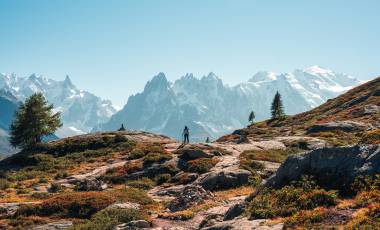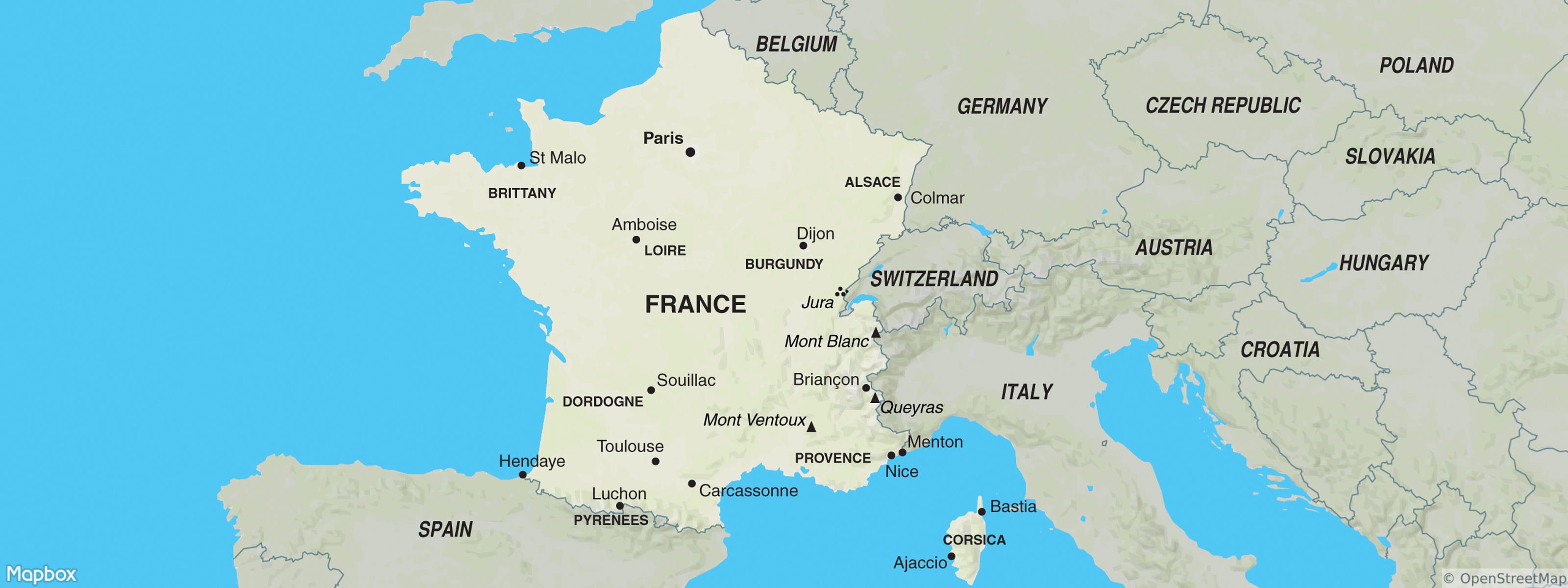Say bonjour to the good life – Alpine vistas, hidden rural gems and arguably the world’s best cheese
Mont Blanc Hiking Highlights

Shape your adventure: With Extensions, every beginning and ending is yours to create. Learn More.
Say bonjour to the good life – Alpine vistas, hidden rural gems and arguably the world’s best cheese

1. The French Alps: The magnificent Alps are marked by huge glaciers, cliffs and waterfalls, and massive snow-clad summits. As you zigzag up the valley, forests take over, before thinning away to reveal the mountains. The pretty town of Chamonix tends to be the base for those wanting to explore the mighty Mont Blanc, the highest mountain in the Alps. In the summer, trek through sweet-smelling pastures, while in winter explore the snowy wilderness on snowshoes. Dotted among the dramatic peaks you’ll find charming alpine villages where you can enjoy authentic French cuisine and learn about the region’s rich cultural heritage.
2. Provence: In southeastern France, Provence is a Francophile’s dream, where fragrant lavender fields drift into medieval hamlets and meals are shaped by the land itself. Traditional culture thrives in the cobbled lanes of Forcalquier and graceful boulevards of Aix-en-Provence, while the countryside is rich with welcoming vineyards and silvery olive groves.
3. The Loire Valley: Punctuated by more than 300 UNESCO World Heritage-listed chateaux, including the iconic Château de Chambord and Château de Chenonceau, the Loire Valley is a treasure trove of architectural marvels. As you explore ancient landscapes and world-renowned vineyards, feast on deliciously ripe tomatoes and crusty French bread, and sample some of the best wines that France has to offer, such as Sancerre and Muscadet. With its traditional villages, rolling hills and meandering river, the Loire Valley is a must-visit location in the cultural heart of France.
4. Corsica: A captivating island that rises from the glistening Mediterranean Sea, Corsica is blessed with natural beauty and rich history. This French territory plays host to rugged mountains, gin-clear waters and idyllic villages and is also famous for being the birthplace of Napoleon Bonaparte, adding to its historic significance. Adventure seekers will be in their element on the island as they’ll find a wide range of outdoor activities , as well as cultural experiences such as exploring ancient ruins and sampling delicious local cuisine.
5. Northern France to Brittany & Normandy: The neighbouring regions of Brittany and Normandy are steeped in history, medieval villages and port towns. Cycling from one to the other allows you to take in this culture-rich region of Europe, with a chance to visit D-Day beaches, see the floating abbey of Mont-Saint-Michel and ride a terrain that mixes coast and countryside. There’s great food here too thanks to the location, particularly at Cancale, which is renowned for shellfish.
6. Burgundy & Alsace: Discover picturebook France in Burgundy’s vine-draped hillsides and Alsace’s half-timbered villages and storybook canals. Medieval towns, regal châteaux, and sweeping vineyards pour out history at every turn, while the deep wine and culinary heritage of both regions turns every moment into a journey through taste and tradition.
Meet the Expert
Danny Bell – Product Manager France
“We’ve secured exclusive access to two beautiful chalets for our Mont Blanc Hiking Highlights trip this year, which really sets this adventure apart. I know from experience that there’s nothing like ending an incredible day of Alpine hiking in a warm and welcoming home-from-home. In particular, Chalet Bediere has a central location in Chamonix, which makes it ideal for exploring the world-famous mountain resort. ”

Our tours to France typically span between six and 15 days, depending on the destination and itinerary.
The majority are around eight days in length, which gives you plenty of time to immerse yourself in your destination and sample the best that the area has to offer, while still giving you plenty of time to relax in between transfers.
The best way to explore France is entirely down to your preferences.
We find that cycling, trekking and walking adventure holidays are great ways to explore and experience the country. They let you see France from a close and personal perspective – smells, sounds, sights, tastes and conversations with locals all make for a one-of-a-kind visit.
All visitors from the UK can travel to France for up to 90 days within a 180-day period without a visa. You do not need evidence of a negative PCR test or Covid vaccination, either; just a passport with three months validity.
Your list of things to pack when heading on a trip to France depends on what you’ll be doing.
Any trip involving hiking or walking calls for a pair of strong, comfortable walking boots, and clothes that suit the season. In warmer times of the year, lightweight, sweat-wicking layers and thin waterproofs are a good idea, as well as sun cream. For winter, warm underlayers, wind and waterproof layers, and a hat and gloves to keep the cold at bay.
France’s currency is the Euro (€).
French towns and cities have plenty of bureau de change locations where you can exchange money. However, you may find that purchasing foreign exchange for your trip to France is cheaper using an overseas debit card, or at a local bureau de change in your home country.
France’s weather differs depending on the location and season. Overall, its climate is temperate and seasonal so, while it’s typically mild, hot and cold extremes can be common in the summer and winter months. Autumn is typically much wetter than the rest of the year, too.
That being said, France is a large country which straddles several climate zones:
The best time to visit France depends on the activities that you want to experience during your trip.
For the hottest, sunniest weather, July and August is the best, though beware that this is also the country’s busiest tourist season.
April to June and September to October are good choices for warmer weather and fewer crowds – great if you want more of the country to yourself, such as a higher likelihood of getting a spot at top restaurants. If you want to travel to destinations like Corsica, this can be the best time of the year to visit.
Low season, between November and March, is much quieter on account of the wintry weather, though you may find that some opening hours for shops, bars and restaurants are a little restricted. Mountainous areas of France like Chamonix in the French Alps are often busier in these months, on account of the ski season.
In France, tipping is not expected or required.
You can leave a supplementary tip for great service but you’re not obliged to do so. And if service is included in the bill, the venue must, by French law, state ‘15% service compris’ at the bottom of the bill – this statement by the French government sets out the practice.
Yes, you can arrange your own travel depending on your requirements. Just talk to any of our team when making your booking – they’ll be able to accommodate your own travel arrangements. If you want them to customise your travel plans for you, they can help you with that, too.
At the time of writing (January 2023), visitors from the UK do not need a visa to visit France if they are travelling there for 80 days or less within a 180-day period. View up-to-date entry requirements via the government’s advice site.
Yes, you can use your European Health Insurance Card (EHIC) or the newer UK Global Health Insurance Card (GHIC) to access medical treatment the same way as a person from France can do.
These cards are not a valid replacement for travel insurance. Every person travelling with Exodus must have a valid policy in place for the duration of their trip to France – find out more here.
Vivienne Morris Cycle Northern France: Brittany to NormandyVaried cycling terrain, canal paths, quiet country lanes, off road through trees, dirt tracks, relatively flat. Good hotels. Lovely food. Good bikes
Michelle Hotham Cycle Northern France: Brittany to NormandyYannis is an excellent guide and very knowledgeable about the area we biked. We had very good accommodations and fabulous food.
Karen Fraser Cycle Northern France: Brittany to NormandyGuide Yannis was very good. Lovely parts of the country, routes mostly kept out of traffic. Hotels often very good, some nice breakfasts. Good bike. Cider factory visit good. I have used Exodus a lot and like the range of trips, which are usually very well organised.

Get regular inspiration straight to your inbox from Exodus’ experts.